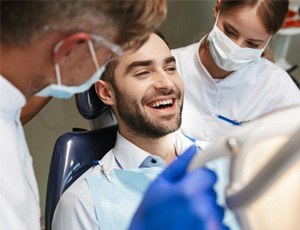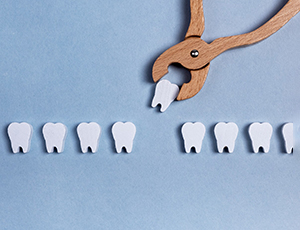Tooth Extractions – Carrollton, TX
Quality Care When You Need It Most

At Epic Family Dentistry of Carrollton, tooth extraction is never our first choice, but we have the experience and technology to make it as easy as possible when you need one. In fact, extractions can actually save the rest of your smile and jawbone from pain, damage, and infection. That’s why Dr. Afshin Azmoodeh offers his extraction expertise for a variety of dental issues. Read on to learn more about tooth extractions in Carrollton and why they’re necessary.
When Tooth Extractions are Necessary

Teeth typically need to be extracted for decay, but this is not the only reason. However, most cases of extraction are caused by infection or damage to the tooth from poor oral hygiene. Decay develops over time, and it can eventually reach the sensitive inner portion of your tooth, causing extreme pain. If the decay is too large for a filling or root canal, we must extract your tooth to prevent infection.
Other instances for tooth extraction are wisdom teeth and dental injury. Wisdom teeth typically get extracted because there’s not enough room for them in the jaw, which can cause numerous problems. Additionally, when a tooth becomes too damaged for repair due to dental injury, we must extract it to make you comfortable and prevent issues down the road.
The Process of a Tooth Extraction

During your initial exam, Dr. Azmoodeh will check your oral health and take X-Rays of the affected area to get an inside look at what’s going on. Once he’s determined that your tooth must be extracted, he will ensure that you’re made numb and comfortable. He also offers sedation dentistry for those who want an extra sense of relaxation during the process.
Once the affected area is prepared and your mouth is numb, Dr. Azmoodeh will use a special dental instrument to gently rock your tooth back and forth for extraction. During this procedure, he ensures that all his patients remain comfortable every step of the way.
Recovery After Extraction or Wisdom Teeth Extraction

Once your tooth is extracted, whether it’s wisdom teeth or for other health reasons, it’s important to follow these key aftercare instructions:
- Take pain medication as prescribed.
- Bite firmly on gauze pads to reduce bleeding and promote clotting. Be sure to replace your gauze before they become soaked in blood, otherwise you can use them for 3 to 4 hours.
- Use a cold compress to reduce swelling but alternate it on and off your face for 10 minutes at a time.
- Give yourself at least a day or two to relax after an extraction. We recommend scheduling your procedure at the end of the week, allowing some time to relax on the weekend.
- Avoid rinsing or spitting forcefully in the first 24 hours.
- Don’t use a straw during the first 24 hours.
- Don’t smoke or use tobacco.
- Only eat soft foods while avoiding anything hard or chewy.
- Prop your head up when laying down.
- Continue to brush and floss your teeth but be sure to avoid the extraction site.
Use these tips for a proper recovery! If it sounds like you could benefit from an extraction or a consultation, contact our office today.
Understanding the Cost of Tooth Extractions

You should remember that tooth extractions will always be your dentist’s last resort for preserving your smile. Still, if a tooth is severely damaged or decayed and can affect the rest of your teeth, removing it may be the most viable option for you. Our team will walk you through the process as well as the cost of tooth extractions so that you know what to expect. After all, we don’t want you worrying about how you’ll pay for necessary dental services. Keep reading to learn more about what you can expect from the price.
Factors That Can Affect Tooth Extraction Cost

Every patient’s smile is different, so it’s difficult to determine the exact cost of tooth extraction without an initial consultation with your dentist. During this visit, we’ll examine your situation to find the root of the problem and develop an estimate for the price of your procedure. In many cases, however, several factors can influence how much you’ll expect to pay, including:
- Quantity –Of course, the more teeth that require removal, the higher the cost of your treatment.
- Location –The kind of tooth and its location in your mouth can affect the price as well as the method of extraction.
- Complexity –Certain situations can be more complex than others, such as an impacted tooth costing more to extract than a non-impacted tooth.
Does Dental Insurance Cover Tooth Extractions?

It’s quite typical for dental insurance companies to offer coverage for at least part of the cost of tooth extractions once you’ve met your deductible. That said, there may be specific limitations before it kicks in, such as the number of teeth needing to be removed or a waiting period. Every plan is unique, so you’ll want to consult your provider about the details of your policy first before moving forward with your procedure. Our team can also help walk you through your plan so you can understand how to make the most of your benefits.
How to Make Tooth Extractions Affordable

Not everyone has dental insurance, but this doesn’t mean they’ll be completely left on their own. If you don’t currently have a policy, you can try exploring alternative financing solutions with our team, such as CareCredit. This third-party financier can help split up your treatment cost into monthly installments, and many of their plans also come with low to no interest! This means that you’ll be able to afford your tooth extraction without having to empty your wallet.
Tooth Extractions FAQs

Have you been told that you’re in need of a tooth extraction? You may still have some unanswered questions about the procedure, so we’re here to help. Here are the answers to some of the most common questions we receive about tooth extractions in Carrollton. If you don’t see the information that you’re looking for below, don’t hesitate to give us a call. We’d be happy to walk you through the process so you know what to expect.
Does Getting a Tooth Extracted Hurt?
Many patients are hesitant to commit to treatment because they are worried that it will be painful. Fortunately, our first step before we begin an extraction is numbing the area with a local anesthetic. This way, you won’t feel a thing. You will likely experience some soreness and discomfort for a few days after the procedure, but this can be managed with recommended over-the-counter and/or prescribed pain relivers from your dentist. By closely following your aftercare instructions, you will be good as new in no time!
Can I Leave the Space Empty After a Tooth Extraction?
If the tooth that is being pulled is toward the back of the mouth, many patients think that they don’t need to have it replaced. After all, if no one can see it, why replace it? The truth is that your teeth do so much more than create a beautiful smile. They are essential to chew properly and speak clearly. One missing back tooth can make it difficult to chew, leading to poor nutrition and indigestion. It is recommended that when you are finished healing, you schedule an appointment to find a tooth replacement that’s right for you.
Can I Smoke After Getting a Tooth Extracted?
Tobacco products can delay healing, so you shouldn’t smoke immediately following your tooth extraction. It’s recommended that you abstain from smoking for at least 5 days afterwards. However, if you can, you should avoid smoking for at least two weeks. If you’ve had difficulty quitting in the past, let us know so we can help you prepare in advance.
How Should I Prepare for My Tooth Extraction?
Preparing for your tooth extraction is just as important as following all of the aftercare instructions. Before your procedure, be sure to be open with your dentist about any questions you have, like what to bring and what to eat the morning of. Check to see if your dentist has any specific instructions, like sticking to just water the morning of or picking up prescription medication.
